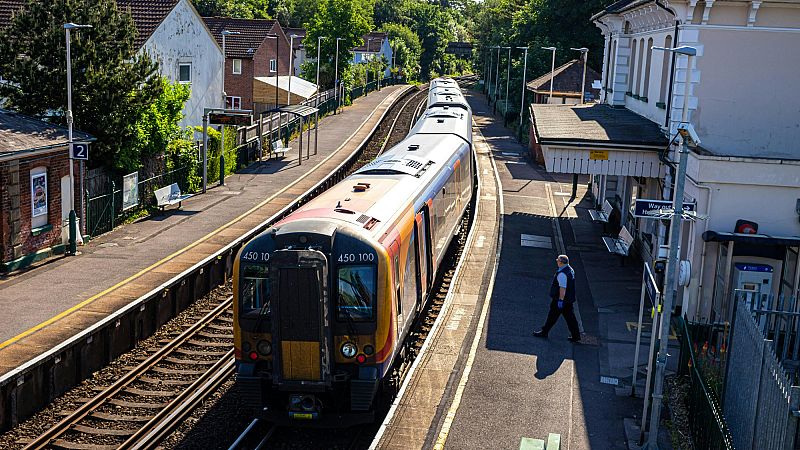
The UK is experimenting with a new ticketless system for rail fares.
Passengers’ journeys will be tracked through their mobile phones using GPS, which will then be used to automatically calculate the lowest price for the trip.
It is currently being trialled in northern England on Northern train services between Harrogate and Leeds. In September, it was also tested by East Midlands Railway on routes between Derby, Leicester and Nottingham.
A similar scheme is already in place in other European countries, including Denmark and the Netherlands.
UK rail fare calculated by tracking passengers’ phones
From Monday, passengers travelling on the Harrogate-Leeds line have been able to try out the GPS ticketing system via an app on their phone.
The app uses location data to identify the passenger's current station before inviting them to check in to begin their journey.
Upon disembarking, passengers have to tap ‘end journey’ on the app.
A message will arrive a few minutes later informing them of how much the journey costs, which authorities say is guaranteed to be the lowest fare.
The app also generates a barcode for ticket inspections and railway station barriers.
Travellers who opt to take part in the pilot receive £15 (€17) of free credit.
The scheme will be rolled out more widely in the coming weeks, covering journeys between Sheffield and Doncaster and Sheffield and Barnsley.
Denmark, the Netherlands, Switzerland: Which countries use GPS-based rail fares?
In Denmark, travellers can use the Rejsekort (travel card) app for public transport, which works as an electronic tap-in tap-out ticket system.
Passengers have to scan their smartphone when boarding public transport, such as at a train platform or on board a bus, at the start and end of each journey.
The system then uses GPS to automatically calculate the price of the journey.
In the Netherlands, travellers with a personal OV-chipkaart, an NS Flex subscription, and the NS Lab app can make use of ‘train travel with GPS’ tracking and automatic fare calculation.
With this system, passengers don’t need to physically check in and out with their OV-chipkaart.
Travellers in Switzerland with the SBB app can use the GPS-based rail fare system called SBB EasyRide. Passengers check in and check out using the app, which tracks their location to calculate the final fare automatically, which should be the lowest possible price.
Does GPS tracking for fares compromise user privacy?
Phone tracking ticketing systems have raised concerns about privacy.
In Denmark, the Rejsekort app was criticised by the Danish Data Protection Agency (Datatilsynet) because it required iPhone users to grant access to their location at all times, including when the app wasn’t in use.
Now, travellers can select the ‘while using the app’ setting for sharing location data.
The Netherlands’ transport authority says travellers using the NS Lab app who have enabled the option 'train travel with GPS' permit the app to start collecting the data as soon as they reach a station’s geofence (the virtual boundary of a real location, in this case stations and train tracks in the Netherlands).
Train travel with GPS is deactivated as soon as the app establishes that you have left the station (not by train) or after you end or the app automatically ends the train journey.
Your personal data is processed for no more than 20 minutes after you leave the geofenced area.
If you go to, pass by or stay within the geofence of a station and do not use or switch on the NS Lab app and train travel with GPS, no personal data is processed.







